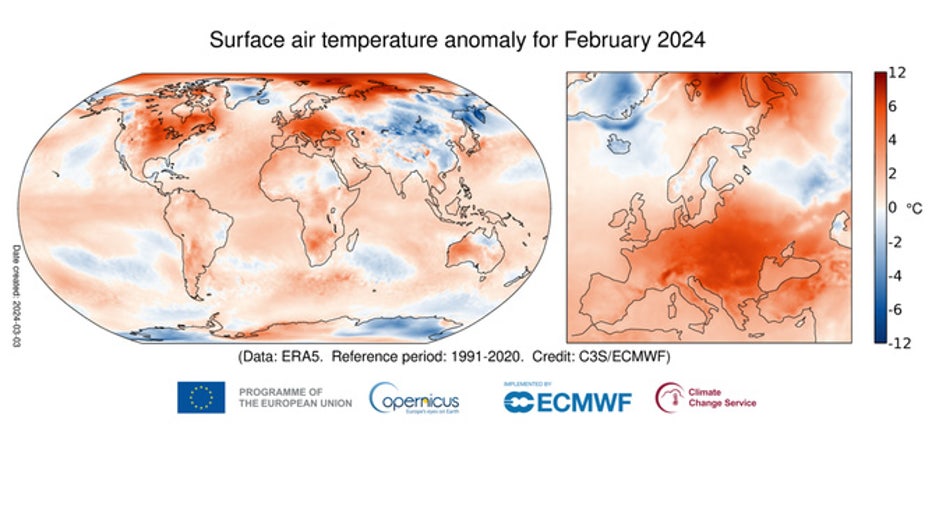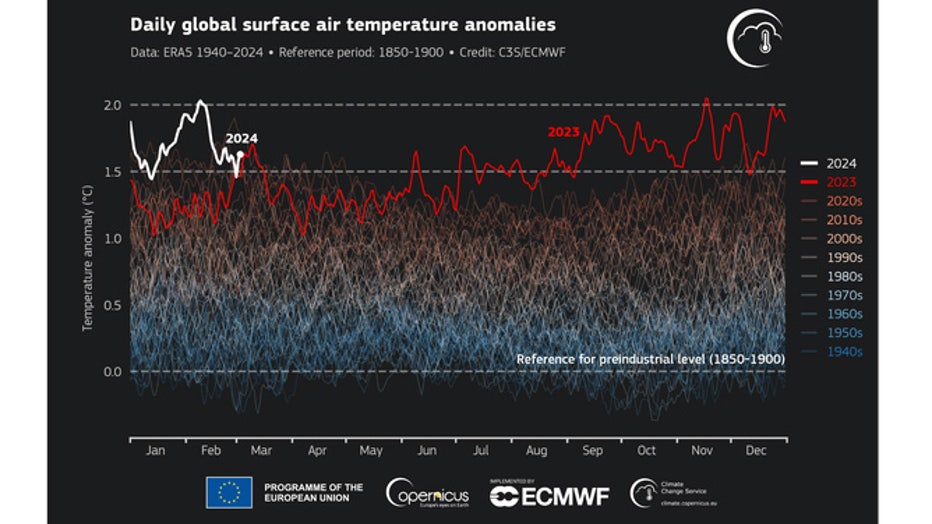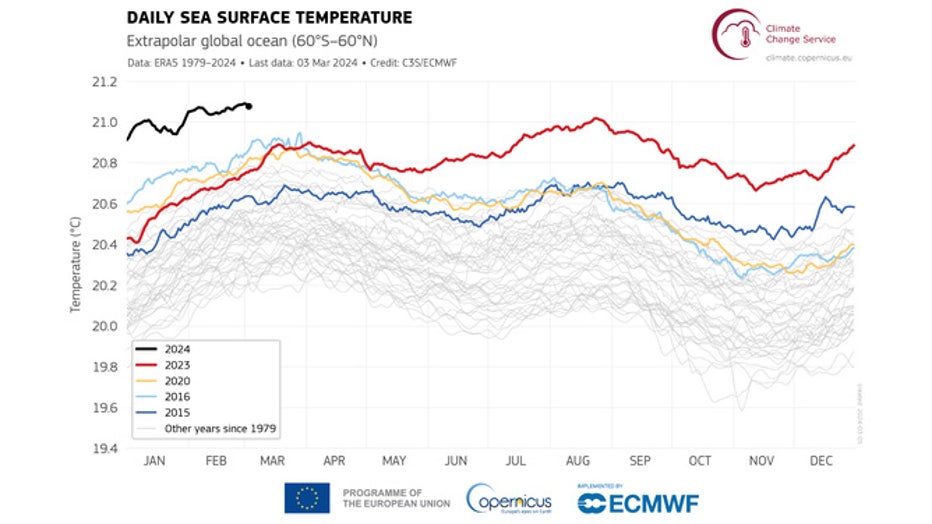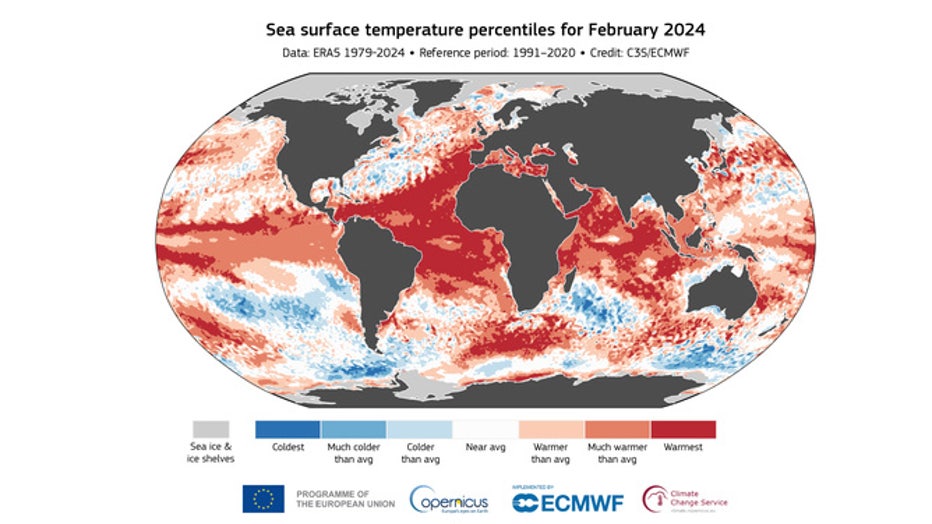Earth sets heat records for 9 straight months as February 2024 goes down as planet’s hottest
February 2024 was the hottest February on record for the world, which makes it the ninth month in a row to be the hottest on record, the European Union's Copernicus Climate Change Service announced Tuesday.
With a global average surface air temperature of 56.37 degrees Fahrenheit (13.54 degrees Celsius), February was 0.21 degrees F warmer than the previous record of February 2016.
"The daily global average temperature was exceptionally high during the first half of the month, reaching 2°C (3.6 degrees F) above the 1850–1900 levels on four consecutive days (8–11 February)," the service said in a statement.
2024 ALREADY HAS 99% CHANCE OF BEING AMONG 5 HOTTEST YEARS ON RECORD, NOAA SAYS

Air temperatures compared to normal. (Copernicus Climate Solutions / FOX Weather)
For those keeping score, February 2024 was 1.45 degrees F warmer than all Februaries averaged together between 1991 and 2020. The month was also 3.18 degrees F (1.77 degrees C) warmer than the estimate for the designated pre-industrial reference period between 1850 and 1900.
"February joins the long streak of records of the last few months. As remarkable as this might appear, it is not really surprising, as the continuous warming of the climate system inevitably leads to new temperature extremes," said Copernicus director Carlos Buontempo in a statement. "The climate responds to the actual concentrations of greenhouse gases in the atmosphere, so unless we manage to stabilize those, we will inevitably face new global temperature records and their consequences."
JULY WAS WORLD'S HOTTEST MONTH ON RECORD, SCIENTISTS SAY

Monthly global surface air temperature anomalies (Copernicus Climate Solutions / FOX Weather)
The past 12 months have been the hottest on record. March 2023 to February 2024 was 1.22 degrees F warmer than the 1991-2020 average and 2.80 degrees F above the pre-industrial average. This follows from the warmest year on record – 2023.
Meteorological winter, December through February, also hit the record books as the warmest on record. The average temperature was 1.40 degrees F warmer than the 1991-2000 average.
Sea surface temperatures were warmest on record for any month
This year not only marked the warmest February on record for sea surface temperatures, but it was also the warmest month ever for sea surface temperatures. At 69.90 degrees F, this February beat out the prior record month, August 2023, by 0.14 degrees F.
WHAT RECORD-SETTING OCEAN TEMPS MEAN FOR SEA LIFE AND 2024 HURRICANE SEASON

Sea surface temperatures through the years. (Copernicus Climate Solutions / FOX Weather)
At the end of the month, Copernicus found a new absolute daily high of sea surface temperature of 69.96 degrees F.
Arctic sea ice extent was 2% below average, far from the minimum ice extent measured in February 2018 of 6% below average.
Antarctic sea ice came in at the third lowest in history – 28% below average. Copernicus points out that the number isn't far from the all-time minimum of 33% below average from February 2023.

Sea surface temperatures compared to normal. (Copernicus Climate Solutions / FOX Weather)
Did the Earth exceed the 1.5-degree C climate threshold?
So far, it is too early to calculate if the current 1.77 degrees C (3.18 degrees F) change from pre-industrial levels exceeds the Paris Agreement benchmark of 1.5 degrees C (2.7 degrees F).
According to the U.N.’s recent climate assessment report, a 20-year average of the global mean temperature must exceed 1.5 degrees C (2.7 degrees F) for the Paris Agreement to be broken.
MEASURING GLOBAL WARMING: NO ONE CAN AGREE HOW TO CALCULATE 1.5 DEGREE INCREASE IN PARIS AGREEMENT

File: A demonstrator carries a globe with a model of the Paris Eiffel Tower, with reference to the 2015 Paris Agreement to limit global warming preferably to 1,5 degrees Celsius. (ARMANDO BABANI/AFP / Getty Images)
"A single year of exceedance above 1.5°C does not mean we have breached the iconic threshold of the Paris Agreement, but it does reveal that we are edging ever closer to a situation where 1.5°C could be exceeded for an extended period," said Leon Hermanson, Ph.D., of the United Kingdom Met Office.
The countries that ratified the 2015 Paris Accord pledged to keep the number "well below 2 degrees Celsius (3.6 degrees Fahrenheit) above pre-industrial levels" and to attempt to "limit the temperature increase to 1.5 degrees Celsius (2.7 degrees Fahrenheit)" above pre-industrial levels.
"The 1.5°C figure is not some random statistic," said WMO Secretary-General Prof. Petteri Taalas. "It is rather an indicator of the point at which climate impacts will become increasingly harmful for people and indeed the entire planet."

